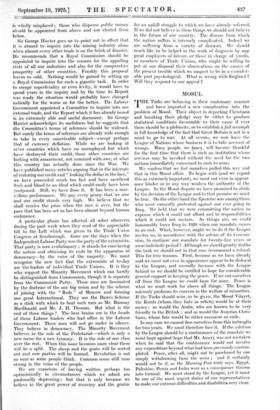mosui,
THE Turks are behaving in their customary manner and have imported a new complication into the problem of Mosul. Their object in deporting Christians and breaking their pledge may be either to produce statistical conditions favourable to their cause if ever there should be a plebiscite, or to establish a fait accompli in full knowledge of the fact that Great Britain is not in a mind to go to war. At all events, we now have the League of Nations whose business it is to take account of wrongs. Many people, we fancy, will become thankful for the first time that there is such an institution whose services may be invoked without the need for the two nations immediately concerned to rush to arms..
We confess that we feel ourselves pulled this way and that in this Mosul affair. To begin with (and we regard this as extremely important), we must not even in appear- ance hinder or in any way weaken the authority of the League. In the Mosul dispute we have promised to abide by the decision of the League and to that promise we must 'be true. On the other hand the Spectator was among those who most earnestly protested against our ever going to Iraq. We held that we were committing the nation to expense which it could not afford and to responsibilities which it could not sustain. As things are, we could honourably leave Iraq in 1928 when our mandate comes to an end. What, however, ought we to do if the League invites us, in accordance with the advice of its Commis- sion, to continue our. mandate for twenty-five years or some indefinite period ? Although we should greatly dislike the task we should not in that case recommend a refusal. This for two reasons. First, because as we have already said we must not even in appearance appear to be disloyal to the League, and secondly because with the League behind us we should be entitled to hope for considerable general support in keeping the peace. If we cut ourselves off from the League we could hope for none. Peace is what we must work for above all things. The League solemnly professes its concern in the welfare of minorities. If the Turks should seize, or be given, the Mosul Vilayet, the Kurds (whom they hate as rebels) would be at their mercy; so would the Arabs, who are known to be very 'friendly to the British ; and so would the Assyrian Chris- tians, whose fate would be either massacre or exile.
In any case we cannot free ourselves from this imbroglio for two years. We must therefore face it. If the solution by the League should be it continuance of the mandate we Must hope against hope that Mr. Amery was not mistaken when he said that the continuance would not involve any expenditure beyond what had been previously contem- plated. Peace, after all, might not be purchased by our simply withdrawing from the scene ; and it certainly would not be if, as the Morning Post truly says, Egypt, Palestine, Persia and India were as a consequence thrown into turmoil. We must stand by the League, yet it must be one of the most urgent duties of our representatives to make our extreme difficulties and disabilities very clear,










































 Previous page
Previous page